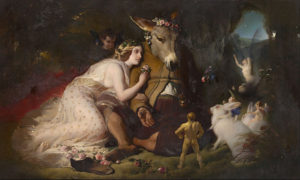 In William Shakespeare’s A Midsummer Night’s Dream, the word “dream” appears repeatedly, sometimes referring to actual dreams, the fantastical night in the forest, plays, which are dreams upon a stage, and love, which seems to be a passing fancy.
In William Shakespeare’s A Midsummer Night’s Dream, the word “dream” appears repeatedly, sometimes referring to actual dreams, the fantastical night in the forest, plays, which are dreams upon a stage, and love, which seems to be a passing fancy.
A Midsummer Night’s Dream is a meta-play, a play about plays, as we watch comic characters rehearse and perform a play, then watch the audience watching the play at a wedding party. (A Midsummer Night’s Dream was probably written for a wedding party like the one in the play.) Ironically, Pyramus and Thisbe, the play in the play, has almost the same plot as Romeo and Juliet: star-crossed lovers separated by their families take their own lives. Shakespeare, then, is parodying his own play, along with notions of romantic love, especially love at first sight, which has more to do with enchantment than true love.
In the opening scene, Lysander says, “The course of true love never did run smooth.” He and Hermia mention many obstacles to love, including blood (family, which is what is separating this pair of lovers), class (“too high to be enthrall’d to low”), age (“to old to be engaged to young”), and the opposition of friends. Even when there is “a sympathy in choice / War, death, or sickness lay siege to it, / Making it momentary as a sound, / Swift as a shadow, short as any dream / . . . / And ere a man hath power to say ‘Behold!’ / The jaws of darkness do devour it up: / So quick bright things come to confusion” (Shakespeare 5; Act I, Scene 5).
Is the author of Romeo and Juliet rejecting entirely the notion of romantic love, even “true love,” as a short-lived dream, or is he only parodying a certain type of romantic infatuation, the type of love which is a “quick bright thing”?